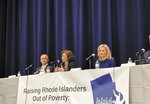


Housing, education, healthcare and food security were the main topics gubernatorial candidates addressed Friday in a forum hosted by the Interfaith Coalition to Reduce Poverty. The panel of candidates included Governor Dan McKee, Secretary of State Nellie Gorbea, Matt Brown, Dr. Luis Daniel Munoz and Ashley Kalus; Helena Foulkes was unable to attend due to an illness.
Emceed by David Veliz, Director/Organizer of RI Interfaith Coalition to Reduce Poverty, the forum had five experts in their fields ask candidates questions.
Kristina Brown, who works as the program officer of housing and economic policy for United Way of RI asked candidates how they intend to ensure that state and federal dollars allocated to the development of affordable housing will produce units through the entire state. She said over the last two years, Rhode Island has seen the housing crisis worsen and – according to the National Income Housing Coalition – Rhode Island has a deficit of 24,000 homes that are available and affordable to the lowest income households.
Kalus: Kalus said in her first month as governor, her administration will put together a council of cities that have missed the 10 percent goal and ask local leaders what they can do to meet that standard. The expectation is to work with developers/local leaders to find a solution to create housing stock in the community.
McKee: Since Rhode Island does not have a housing plan, McKee said the first step would be to create one. In the FY 2023 budget, he said $250 million is allocated for housing. He said the government now has a Secretary of Housing and he is working on a governance model to empower the Secretary of Housing to manage funds that the state can invest in housing. McKee also shared that in his first budget he included a funding stream for low-income housing.
Gorbea: Gorbea, who previously served as the executive director of Housing Works, said she comes with the knowledge and expertise to address the challenges of building affordable housing. As governor, she would use a significant amount of the state’s American Rescue Plan Act (ARPA) funds to build affordable homes. She would also work with cities and towns on this issue and thinks the Secretary of Housing should be in the office of the governor and not the commerce office.
Munoz: As governor, Munoz said he will stand with the people and create incentive programs around infrastructure with municipalities to encourage them to increase housing stock; the state also needs zoning issues addressed in terms of multi-family housing. Munoz said if the community is not educated, nothing changes – saying that the governor should be the state’s activist, educator and first one to act when issues arise. Munoz said the rent relief program and its management of how the funds are dispersed is problematic and local resources are not being used enough.
Brown: Brown said there is a barrier to building multi-family homes across the state and called to eliminate these bans. He would also like to fund the construction of 10,000 green, affordable homes within Rhode Island and – under his plan – no one would pay more than 20 percent of their income for those homes.
Andrew Schiff, CEO of the Rhode Island Community Food Bank asked candidates if they would commit to using state funds to provide free school meals to all children in Rhode Island. There has been a significant increase in food insecurity and hunger and, while the federal government took steps to reduce child hunger by making school breakfast and lunch free for all students, that provision is ending. All candidates said yes to continued funding.
Marcela Betancur, the executive director of the Latino Policy Institute, asked what specific policies candidates would propose to address long standing racial and ethnic disparities in the state.
Gorbea: According to Gorbea, the best way to have policies that address the state’s diversity is by putting people in power and positions that reflect diversity of the state. During her career, she has brought together people of diverse backgrounds to the policy making table and plans to do the same as governor. She said the government has the ability to work with the nonprofit sector and would like to restructure the way the two partner with each other.
McKee: McKee said there are millions of dollars in the budget for nonprofits to address food insecurity and other issues. He redid the office of Diversity and Economic opportunity and implemented a Hispanic leader; McKee said he is making sure Rhode Island follows the state law that requires 10 percent of government contracts to go to minority and women owned businesses. He also has an education package and would like to implement a higher education academy to help families bump up their degrees – whether it’s certificate, associate or bachelors – to the next level.
Kalus: Over the past decade, Kalus said she has worked to ensure that communities have access to power. She served as the director of public engagement and outreach and took on the position because she wanted to ensure that Black and Brown communities and communities that did not have lobbyists had access to the governor’s office. Kalus said the Democratic Party has failed a generation of Black/Brown communities in the state and advocates for education reform and economic opportunity.
Brown: Brown would like to shut down the polluting industries in the Port of Providence, build 10,000 affordable homes and cap annual rent increases at four percent. Additionally, he would like to pass the Equality in Abortion Coverage Act so everyone on Medicaid has access to abortion. He said change to the criminal justice system is needed and has caused harm to Black and Brown people -- he calls for an end to cash bail, end for profit prisons and to free all nonviolent drug offenders. Lastly, Brown would raise taxes on the one percent and fund schools every child receives a quality and equal education.
Munoz: Munoz said there needs to be more candidates of color and people of color leading the nonprofit organizations and an end to redlining. Munoz advocated for having a livable minimum wage that is $25 plus. He said there needs to be a stop to any form of a merger that reduces the likelihood of any form of health equity and said the state needs to listen to Providence students when they say they don’t want SROs slamming them on the ground but want mental health workers provided instead.
Linda Katz, who works as the policy director for the Economic Progress Institute, addressed economic security with her question. She said the Department of Human Services (DHS) is responsible for processing the eligibility for Snap, Rhode Island Works, GPA and Child Care Assistance Program; Katz asked candidates what they would do to ensure that DHS provides residents with efficient and timely access to basic needs benefits while addressing needs for sufficient in-person application assistance as well as online application.
Kalus: To address this vulnerable population, Kalus calls for creating a culture of customer service and accountability and delivering results in a timely manner. She said in terms of accountability, there needs to be something equivalent to the VA Accountability Act which will drive accountability through the department. It also needs to be ensured that all services are accessible online, can be managed online and are mobile friendly. Lastly, there should be multi-lingual support and convenient hours for in-person access for working people so they don’t have to take time out of work to access services.
Munoz: Munoz said to stop privatizing public health in Rhode Island and outsourcing to middlemen companies. The focus should be on investing in mutual aid organizations and getting grant dollars to them. He said one thing he learned on the Equity Council when running vaccine clinics was that the community organizations can rally more effectively on the frontlines to meet people where they were. He said Rhode Island needs a governor who’s the state’s activist.
McKee: McKee mentioned that DHS has some “skeletons in its closet” with Uhip and other things. The government sent a team to DHS and are working through the issue – the big one being the Medicaid re-upping which is coming up. McKee said in the budget he has put in for additional staff and said he has visited DHS sites around the state -- spending 20 to 30 hours with DHS staff to understand the problems they’re having.
Gorbea: Gorbea said the issues at DHS are critical because the institution deals with people who need the most help from the government. She said she doesn’t understand why so much time was spent with offices closed and applications not being processed for Snap benefits. As governor, she said she can bring people together to get processes done.
Brown: To achieve upward mobility for the people, Brown said there needs to be electoral organizing work to oust people in power who have been crushing working people for decades and elect people who will look out for Rhode Island’s communities. He said there needs to be a new majority in the house and senate to enact policies on housing, healthcare, wages and schools.
Paige Clausius-Parks, the senior policy analyst for RI Kids Count finished off the questions from field experts. Her question came in three parts: one, what changes do candidates think are needed for early childhood through the state’s Pre-K system so all children receive the high quality education they need to succeed? Two, would candidates support a change to the state’s funding formula to provide more support to multilingual learners? Three, would candidates support a Rhode Island constitutional amendment to establish that an equal, adequate and meaningful education is a fundamental right?
Munoz: Munoz believes in universal Pre-K and said there needs to be long term supplemental wage programs for childcare workers to ensure there are more people in that profession so they can support daycares across the state. Additionally he said in terms of early education, there is not enough done to support students and identify needs early, so when it comes to the education formula, yes he supports it, but addressed the fact that the formula needs to be completely restructured. Munoz said there needs to be a comprehensive after school program throughout the state and would like to expand the RI Promise program to non-traditional students to ensure that those who can only attend part time can be part of this endeavor.
Gorbea: Gorbea said she saw the difference Ready to Learn had in the lives of her children and their peers at home day care; she supports more investments in this area. As for multilingual learners, Gorbea said these individuals are assets to the economy. When she goes to small business presentations, she thinks ‘what are the opportunities this business is missing because it is not tuned into communities that have access to different languages in different countries.’ She would also support the constitutional amendment.
Kalus: Kalus said the school funding formula needs to change to support special needs and ESL students. For education reform, she suggested looking to Massachusetts. She said there needs to be high standards and higher pay for teachers. Kalus suggested recruiting teachers to failing schools to help turn them around. To level the playing field, Kalus believes in universal Pre-K and the school funding formula. She’d like to also close gaps from covid learning loss by having after school programs and tutoring. Lastly, since there is no one learning style, Kalus said there should be a version of Davies High School in every county.
Brown: Brown answered yes to both the constitutional amendment and funding formula. He would also look at raising teachers’ salaries and making class sizes smaller.
McKee: McKee said yes to the constitutional amendment and funding formula. He said there is over $445 million in the budget to address education issues. He also mentioned his experience opening Blackstone Valley Prep and the school’s success in closing learning gaps.
Veliz said Rhode Island has some of the highest utility rates in the country and asked candidates if they would support the passage of a percentage income payment plan which would allow Rhode Islanders with a lower income bracket to pay less in utilities as a percentage of their income.
Brown: Yes, Brown would support this passage. He said it is essential and commended advocates who have come up with a solution and put it on the table. He said the source of energy is a broader problem and the fossil fuel industry in the Port of Providence should be shut down. The state should build up rooftop solar, wind power, electrify its bus fleet and enact a new green deal.
McKee: McKee said he’s proposing a reduction in the utility bills by using some of the state’s surplus money for that. He said for offshore wind issues, he signed the Act on Climate and he plans on investing over $150 million in renewable sourced energy strategies, investing in a port in East Providence which would bring in more jobs and provide money for fisheries so places like Galilee continue to prosper.
Munoz: Yes, Munoz supports the passage. He proposes that the government should have a tax placed on fossil fuel companies that pulls into a categorical fund and that the categorical fund can supplement these programs.
Kalus: No, Kalus does not support the passage. She does not believe in income-based bills but believes in programs to provide relief for families and believes the government should look at structural issues that cause the problem.
Gorbea: Gorbea said she is not familiar with this particular bill but it sounds interesting and would take a look at it and be willing to have a conversation about it.
Comments
No comments on this item Please log in to comment by clicking here